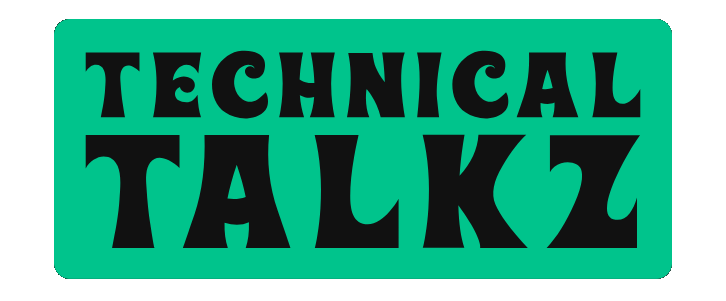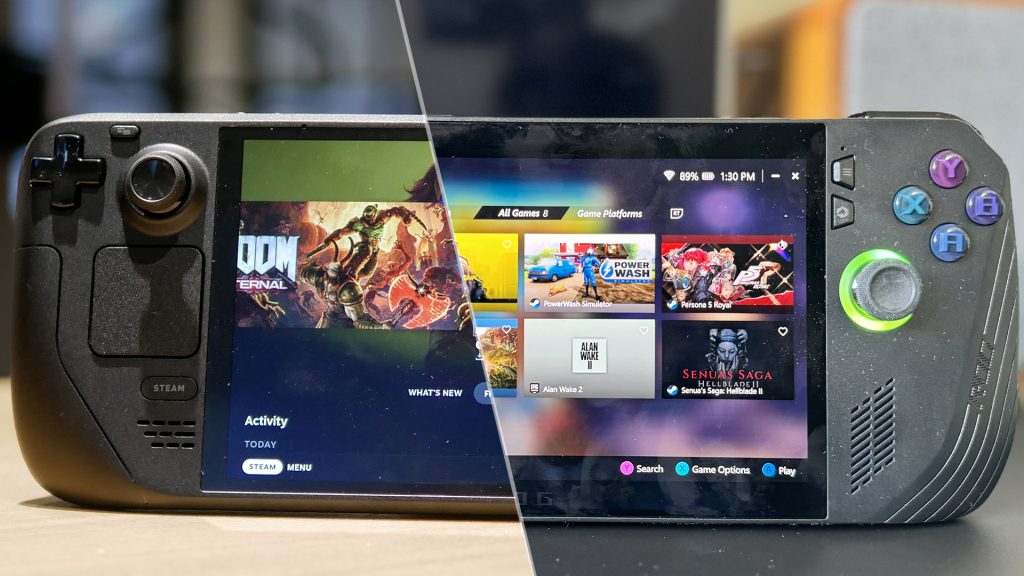Steam Deck OLED vs ASUS ROG Ally brings ultimate hotness in the handheld gaming space. What started with a nostalgic nod to Game Boys and PSPs has exploded into a full-blown war between serious PC-grade contenders. And in 2025, two names dominate this arena: the Steam Deck OLED and the ASUS ROG Ally. But with both boasting impressive hardware and unique ecosystems, which one deserves your hard-earned cash?
Let’s dive deep into the specs, features, and performance of these two juggernauts to determine the ultimate handheld gaming PC of 2025.
🎮 Design and Display – OLED Brilliance vs. High-Refresh Precision
Steam Deck OLED makes its entrance with a significant design overhaul. It’s lighter, cooler, and more power-efficient than its LCD predecessor. But the real star here is the 7.4-inch OLED display with HDR support. Blacks are deeper, colors pop, and games like Cyberpunk 2077 and Elden Ring look absolutely gorgeous.
On the flip side, ASUS ROG Ally rocks a sleek, futuristic chassis with a 7-inch Full HD 120Hz LCD display. While it can’t match the OLED’s contrast, it delivers buttery-smooth gameplay, especially in competitive titles like Valorant and Fortnite. If high refresh rates matter more to you than color vibrance, the Ally has the edge.
Winner (Display): Steam Deck OLED for immersive single-player visuals, but ROG Ally snags a win for competitive gaming with its 120Hz refresh rate.
🧠 Performance – AMD vs AMD (With a Twist)
Both devices run on AMD chips, but their configurations matter:
- Steam Deck OLED: Custom AMD APU (Zen 2 + RDNA 2)
- ROG Ally: AMD Ryzen Z1 Extreme (Zen 4 + RDNA 3)
Here’s where the ROG Ally pulls ahead. The Z1 Extreme is a performance beast with higher clock speeds and better GPU architecture. It handles AAA games at 1080p with more stability and can even run demanding titles like Starfield or Baldur’s Gate 3 without needing aggressive FSR scaling.
The Steam Deck, while optimized for 800p, occasionally struggles in newer titles unless you tweak settings or use performance mods.
Winner (Performance): ASUS ROG Ally, no contest.
🛠️ Software and Ecosystem – SteamOS vs Windows
The Steam Deck runs SteamOS, a Linux-based system optimized for the Steam ecosystem. It’s intuitive, clean, and absolutely killer for gamers who live on Steam. The addition of Proton (a compatibility layer) means even many Windows-only titles run surprisingly well.
However, the ROG Ally runs full-fledged Windows 11, meaning you can install anything—Steam, Epic Games Store, Xbox Game Pass, mods, and emulators. The downside? Windows isn’t optimized for handheld controls, which leads to a slightly clunky UX unless you tinker.
Winner (Software): Steam Deck OLED for plug-and-play ease; ROG Ally for power users and tinkerers.
🔋 Battery Life – OLED Efficiency FTW
Valve’s biggest improvement in the OLED model is the battery. Thanks to the OLED panel and improved thermal design, it delivers 30-50% longer battery life compared to the original Deck—up to 6-8 hours on moderate use.
In contrast, the ROG Ally, despite its more efficient chip, suffers from Windows bloat and a power-hungry screen, averaging around 3-5 hours under real gaming loads.
Winner (Battery): Steam Deck OLED.
🎧 Audio, Thermals, and Build Quality
- Audio: Both offer stereo front-firing speakers, but the Deck OLED’s audio feels fuller and richer.
- Thermals: The OLED runs cooler and quieter thanks to improved fan curves and ventilation.
- Build: Both are sturdy, but Valve’s ergonomic design feels better in hand over long sessions.
Winner (Overall Design & Feel): Steam Deck OLED.
🏆 Final Verdict – Which Handheld Reigns Supreme in 2025?
Here’s the TL;DR:
| Category | Winner |
|---|---|
| Display | Steam Deck OLED |
| Performance | ROG Ally |
| Software | Tie |
| Battery Life | Steam Deck OLED |
| Ergonomics | Steam Deck OLED |
| Customizability | ROG Ally |
If you want raw power, customization, and a Windows-based experience, the ASUS ROG Ally is your weapon of choice.
But if you’re after portability, battery life, and a gorgeous OLED display backed by Valve’s seamless Steam integration, the Steam Deck OLED is the ultimate companion.




